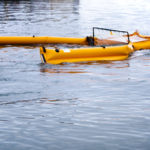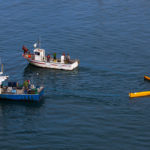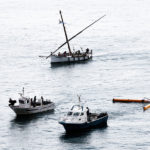What does Waste Free Oceans do?
The Waste Free Oceans Foundation’s main goal is to reduce the global impact of marine litter. By mobilizing fisheries, recyclers, manufacturers and policy makers, WFO aims to reduce, recycle and ultimately reuse marine litter, mitigating the impact on both the environment and natural resources. WFO’s main operations include conducting marine litter and beach clean-ups, policy advocacy and collaborating with partners on “closing the loop” projects, designed to transform collected marine litter and to create new and innovative products.
How and why did it start?
Waste Free Oceans was founded in 2011 as an initiative of the European plastics industry to address the growing concern of marine plastics. WFO has since grown into an independent organization that operates worldwide. It relies on funding from public donations, project collaborations and corporate partnerships.
How many people are involved and what are their roles?
Waste Free Oceans unites the fishing sector, the plastics industry and processors with the aim of reducing and reusing floating waste. We collaborate with both fishermen and companies to transform ocean waste into new products. Fishermen collect so-called “ghost nets,” plastic bottles and other plastic wastes. Recyclers sort and clean the refuse; and companies recycle the raw material to produce a new product. WFO’s network is spread all over Europe, as well as the Americas, Asia and Turkey.



What are the main actions or areas of focus?
WFO’s main operations include conducting marine litter clean-ups by using special fishing trawls that can each collect between two and eight tons of floating litter (see photo). We conduct beach clean-ups, by partnering with organizations. We also practice policy advocacy, including presenting and holding forums at the European Parliament and Commission and collaborating with partners on “closing the loop” projects, designed to transform collected marine litter and to create useful products to educate consumers in line with a circular-economy approach.
WFO joins hands with companies, big and small, that want to send a clear message of intelligent use of resources and protecting our ocean environments. We believe waste is a valuable resource that can be used.
How can people help?
There are various approaches to tackling the global issue of plastic waste in seas. While preventing dumping is key, brand owners and companies can get involved in recycling waste into new and sustainable products. The value chain begins with collection at sea. As public awareness is increasing, WFO is confident in its capacity to develop new partnerships worldwide and engage in practically oriented actions to reduce the amount of floating debris. You can also check our donation and shopping page on our website.
The post Conservation Spotlight: Waste Free Oceans appeared first on Scuba Diver Life.
from Scuba Diver Life https://ift.tt/2MbXAOZ
No comments:
Post a Comment